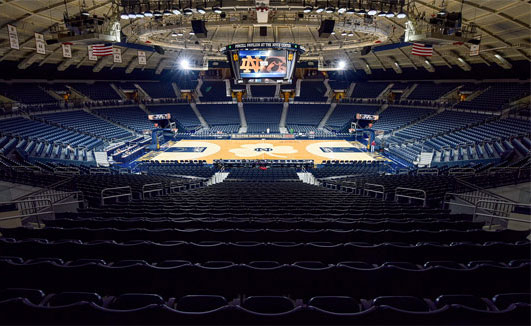Notre Dame basketball coach Digger Phelps' upset orchestration was producing sweet music today (March 3, 1977). All he needed was a soloist who could play taps over San Francisco's 29-game winning streak — and he found one in guard Donald (Duck) Williams.
Williams, a product Washington's Mackin High School, flapped and waddled in the middle of Notre Dame's spread offense and drowned the Dons and their No. 1 ranking in an ocean of marvelous solo baskets. By the time he finished, San Francisco was vanquished, 93-82.
The Dons afterward tried to shrug off the defeat, saying their real season starts next week with the NCAA tournament. But what happened today has to leave lasting scars.
They came into the Athletic and Convocation Center trying to prove their season 29-0 record and top ranking had not been built on a bunch of creampuff opponents. They left hearing the sting of critical voices questioning their intensity and defensive skills.
Certainly, the San Francisco players had never before faced what hit them today. The wildly enthusiastic crowd, the aggressive rebounding and defense of the Irish and Williams' stunning effect combined to end the Dons' regular-season schedule on a sour note.
Williams, who developed his one-on-one moves on the Washington playgrounds, finished with 25 points, including 17 in the second half when he overwhelmed three different San Francisco players who took turns guarding him.
His brightest moments came nine minutes into the final period. Notre Dame went to its spread offense after taking a 61-58 lead, with Williams the man in the middle.
He immediately beat 6-foot-6 Winford Boynes with one of his quick hesitation dribbles and drove the lane for a lay-up. He followed with a basket off a fast break, then with another whirling bucket after leaving Boynes flat-footed at the foul line. He was fouled on the play, made the free throw and Notre Dame went ahead, 68-60.
Seconds later, he was at it again, whipping Boynes up high for the third time and ending his effort once more with an easy lay-up inside San Francisco's flat-footed big men. One final superlative drive followed, and now Notre Dame was leading by 10 points, and San Francisco's hopes of a perfect regular season was over.
"Boynes is three inches taller than me and I thought I could beat him with my quickness," said Williams, who had scored 13 points in just four minutes."You have to be confident. I knew we weren't trying to stall."
San Francisco had opened the half in a zone. Phelps, who thought his team was quicker than the Dons, felt that if his team could get ahead and he could go to the spread, the Irish could force San Francisco into a man-to-man defense. He guessed right.
Williams' heroics put away San Francisco, but the Dons' problems began much earlier, when they began giving ground to Phelps' game plan.
Phelps knew that his front line, which outrebounded opponents by an average of 12 a game (the best in the nation), had to control the backboards. He also didn't want the Dons to unleash their fast break. And he figured that he could confuse them with a combination of tough, aggressive defenses.
He was correct on all counts. Notre Dame won the backboard struggle, 42-33, as forward Toby Knight pulled down 14 by outmuscling 6-11 Bill Cartwright (two) and 6-9 James Hardy (seven). San Francisco could register only a handful of fast-break buckets and its set offense was upset, especially inside, by Notre Dame's fronting tactics.
San Francisco was in good shape as long as Cartwright remained active. But he could add only six points to his nine-point first-half effort and he was never a rebounding factor. Hardy, who spent much of his time sulking, never got into the flow of the game, scoring just 12 points.
"I think they are taking the defeat philosophically," said San Francisco coach Bob Gaillard. "You never like to lose, but this has been a good experience for us."
Gaillard lamented over what he called his team's "lack of luck. We hit a dry spell at the wrong time. We missed shots we needed. And we needed them to miss some one-on-ones and have some turnovers. It never happened."
Instead, Notre Dame made 19-of-24 foul shots in the second half and committed only five turnovers, none of which came in the first crucial minutes of the spread offense.
But San Francisco did itself little good with its defensive deficiencies, especially against Notre Dame's spread. When Williams penetrated, no one switched off to pick him up, allowing him to get off easy shots. And the Dons also showed little patience on offense once they fell behind.
"I don't think they gave up," said Knight, "but I'm sure this has left a bad taste in their mouths. But you don't win 29 straight without having a good basketball team."
Notre Dame, of course, also has a good team, at least when it plays close to the Golden Dome. Phelps' squad, which has won 12 of its last 13 to probably earn an NCAA bid with a 20-6 record, has lost just once here this year to UCLA, in 17 games.
But Phelps wasn't taking any chances that the home crowd alone would be enough to give him another in a series of significant upsets that started in 1971 when the Irish (defeated #1 UCLA at the start of its 88-game winning streak before stopping the same streak in 1974).
He had the Notre Dame president, the Rev. Theodore Hesburgh, give Mass this morning. And he said he put his faith on the fact that "St. Jude has been awfully good to me these last few weeks."
St. Jude is the Saint of the Impossible.
 Notre Dame Stops San Francisco's Streak
Notre Dame Stops San Francisco's Streak